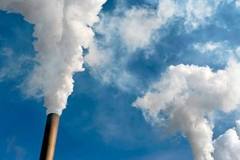[This is dedicated to my unborn grandson, due November 2014. It’s my way of explaining current developments to him.]
I’m not talking about run-of-the-mill bad decisions, which any government might make as part of the complex process of politics and which can be easily reversed by the next government. I’m talking about monstrously stupid decisions that will be incredibly hard to rectify, yet if left unrectified will be a huge burden for decades.
I’m talking about a decision so bad that our descendants will shake their head in incomprehension, sadness and, yes, anger. They will ask how we could have been so badly and stupidly governed.
Today, the Australian government repealed its carbon tax legislation. This tax was paid to the government by major CO2 emitters. Money received was re-distributed to the electorate to reimburse costs passed on by emitters. This was done in a reasonably fair way, with people on low incomes receiving preferential reimbursement compared to those on high incomes.
The carbon tax had been in operation in Australia for two years. It was working [1]; CO2 emissions were falling as gas and renewables replaced coal-fired power generation and industry introduced new processes and saved energy in response to the cost signal. Yes, there were losers in this process, particularly the coal-fired electricity generators. But there were big winners too, particularly new industries based on renewable power and energy efficiency. Jobs might have been lost because of the carbon tax, but jobs were created too.
It needs to be stated clearly why the carbon tax is a good thing. Today there is a 97% consensus [2] among climate scientists that CO2 emissions from fossil fuels are changing the Earth’s climate. The change will be slow at first and there are still many doubters and deniers, but the effects are cumulative and irreversible on the timescales of millenia. In the worst-case scenarios air temperatures will rise 4°C by the end of this century. The polar ice caps and glaciers will melt and the sea level will rise, thereby imperilling infrastructure and threatening the entire livelihood of those in countries like Bangladesh who live close to sea level. More extreme weather events are expected, biodiversity will be affected, the oceans will become more acidic, and there will be adverse effects on human health.[3]
Every credible expert I’ve read says that it would be far better for humankind to act now to avoid problems caused by CO2 emissions, rather than to act in response once effects have occurred.
Meanwhile, the low-carbon future should also be viewed as a huge economic opportunity. There are immensely powerful global drivers at work:
-
Decarbonisation of supply. This is the switch towards solar and wind for electricity generation, and the introduction of new industrial processes that reduce CO2 emissions and save energy.
-
Pollution reduction. Coal doesn’t only involve CO2 pollution, it causes many other problems as well [4].
-
Energy security. Every country in the world wants an assured energy supply, not something that can be turned off at the whim of an autocratic regime elsewhere.
-
New-build infrastructure. Just in case we forget, there are billions of people on this planet still without an electricity grid. These citizens want the convenience of electrical power, and renewables will offer the easiest way for them to get it.
-
Manufacturing policy. Some countries see the low-carbon future as an opportunity to strengthen their industrial base. They will put in place initiatives to promote the interests of their own economies, including R&D incentives and government programs.
Our government is blind to these drivers.
And here is my special message to deniers who don’t accept the science of climate change. The trend is not your friend. Pioneers and early adopters are re-shaping the economic landscape across the world, and they will be rewarded for their foresight as the effects of climate change become more evident. In contrast, those who seek to preserve the status quo – our local fossil-powered dinosaurs – will be left with stranded assets and a huge task to fix the mess that has been caused.
So even if you deny anthropogenic climate change, influential people in the rest of the world disagree with you, and they are today making cool-headed decisions in boardrooms in countries like Germany and China that will affect you tomorrow.
Our fossil fuel reserves are undeniably finite, so we have to move to a clean energy infrastructure eventually. But we now know that our fossil fuel gift from nature comes at a terrible price. If we burn all the fossil fuels we will be hot, flooded, traumatised by weather, threatened by disease and morally weakened by the changes we have wrought to our planet. We are literally threatening the prospects for human life on this planet.
There is a clear path forward that involves collaboration and good governance to move us to a low carbon and then zero carbon future. It’s not even a difficult path, because it offers a cleaner and more comfortable environment, without economic disadvantage, as well as jobs in sunrise industries and better stewardship of our resources. If costs to rectify the damage caused by global warming are taken into account, the low-carbon path actually involves lower costs than the present trajectory [5].
But the low-carbon path is challenged by those who want to preserve their current position and wealth, generally old men who manipulate the levers of power to their advantage.
The repeal of Australia’s carbon tax means we lose valuable time to confront the challenges that we will inevitably face. Apart from the Renewable Energy Target currently under fierce attack by the government, there is no replacement mechanism available in Australia to reduce carbon emissions. The government’s proposed “Direct Action” scheme is so bad that it’s risible. So bad, in fact, that it will not get through the upper house of parliament. And any move towards an emissions trading scheme, offered as a sop by the cross-benchers in the senate as part of the repeal of the carbon tax, will not get through the lower house of parliament in the present government. Past good work to reduce our CO2 emissions will be wasted, and we will be steered by government decisions into a fossil powered economic dead end, instead of towards the industries of the future.
I fear this decision will take years to unwind. In its lust for temporary advantage, the Australian government is acting to harm fellow citizens of our world. It is also reducing Australia’s capability to participate in the inevitable revolutionary development of Earth’s energy infrastructure.
All those who have contributed to this decision should hang their heads in shame. They are going to be very harshly judged by history. A really bad decision indeed!
Noel Barton is Managing Director of Sunoba Pty Ltd. Reproduced with permission.








